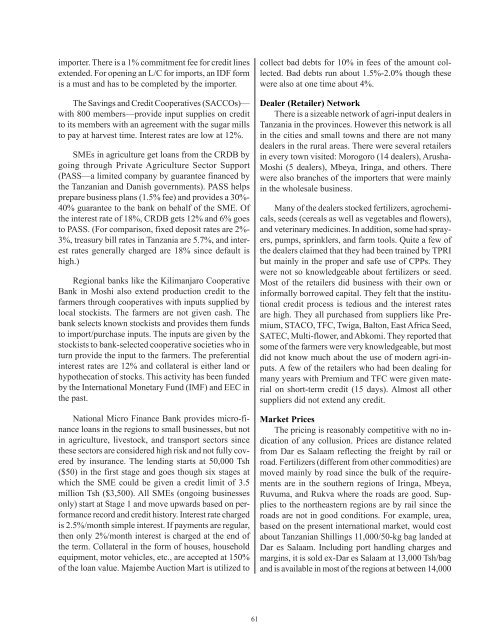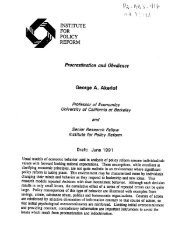An Action Plan for Developing Agricultural Input Markets in Tanzania
An Action Plan for Developing Agricultural Input Markets in Tanzania
An Action Plan for Developing Agricultural Input Markets in Tanzania
Create successful ePaper yourself
Turn your PDF publications into a flip-book with our unique Google optimized e-Paper software.
importer. There is a 1% commitment fee <strong>for</strong> credit l<strong>in</strong>es<br />
extended. For open<strong>in</strong>g an L/C <strong>for</strong> imports, an IDF <strong>for</strong>m<br />
is a must and has to be completed by the importer.<br />
The Sav<strong>in</strong>gs and Credit Cooperatives (SACCOs)—<br />
with 800 members—provide <strong>in</strong>put supplies on credit<br />
to its members with an agreement with the sugar mills<br />
to pay at harvest time. Interest rates are low at 12%.<br />
SMEs <strong>in</strong> agriculture get loans from the CRDB by<br />
go<strong>in</strong>g through Private Agriculture Sector Support<br />
(PASS—a limited company by guarantee f<strong>in</strong>anced by<br />
the <strong>Tanzania</strong>n and Danish governments). PASS helps<br />
prepare bus<strong>in</strong>ess plans (1.5% fee) and provides a 30%-<br />
40% guarantee to the bank on behalf of the SME. Of<br />
the <strong>in</strong>terest rate of 18%, CRDB gets 12% and 6% goes<br />
to PASS. (For comparison, fixed deposit rates are 2%-<br />
3%, treasury bill rates <strong>in</strong> <strong>Tanzania</strong> are 5.7%, and <strong>in</strong>terest<br />
rates generally charged are 18% s<strong>in</strong>ce default is<br />
high.)<br />
Regional banks like the Kilimanjaro Cooperative<br />
Bank <strong>in</strong> Moshi also extend production credit to the<br />
farmers through cooperatives with <strong>in</strong>puts supplied by<br />
local stockists. The farmers are not given cash. The<br />
bank selects known stockists and provides them funds<br />
to import/purchase <strong>in</strong>puts. The <strong>in</strong>puts are given by the<br />
stockists to bank-selected cooperative societies who <strong>in</strong><br />
turn provide the <strong>in</strong>put to the farmers. The preferential<br />
<strong>in</strong>terest rates are 12% and collateral is either land or<br />
hypothecation of stocks. This activity has been funded<br />
by the International Monetary Fund (IMF) and EEC <strong>in</strong><br />
the past.<br />
National Micro F<strong>in</strong>ance Bank provides micro-f<strong>in</strong>ance<br />
loans <strong>in</strong> the regions to small bus<strong>in</strong>esses, but not<br />
<strong>in</strong> agriculture, livestock, and transport sectors s<strong>in</strong>ce<br />
these sectors are considered high risk and not fully covered<br />
by <strong>in</strong>surance. The lend<strong>in</strong>g starts at 50,000 Tsh<br />
($50) <strong>in</strong> the first stage and goes though six stages at<br />
which the SME could be given a credit limit of 3.5<br />
million Tsh ($3,500). All SMEs (ongo<strong>in</strong>g bus<strong>in</strong>esses<br />
only) start at Stage 1 and move upwards based on per<strong>for</strong>mance<br />
record and credit history. Interest rate charged<br />
is 2.5%/month simple <strong>in</strong>terest. If payments are regular,<br />
then only 2%/month <strong>in</strong>terest is charged at the end of<br />
the term. Collateral <strong>in</strong> the <strong>for</strong>m of houses, household<br />
equipment, motor vehicles, etc., are accepted at 150%<br />
of the loan value. Majembe Auction Mart is utilized to<br />
61<br />
collect bad debts <strong>for</strong> 10% <strong>in</strong> fees of the amount collected.<br />
Bad debts run about 1.5%-2.0% though these<br />
were also at one time about 4%.<br />
Dealer (Retailer) Network<br />
There is a sizeable network of agri-<strong>in</strong>put dealers <strong>in</strong><br />
<strong>Tanzania</strong> <strong>in</strong> the prov<strong>in</strong>ces. However this network is all<br />
<strong>in</strong> the cities and small towns and there are not many<br />
dealers <strong>in</strong> the rural areas. There were several retailers<br />
<strong>in</strong> every town visited: Morogoro (14 dealers), Arusha-<br />
Moshi (5 dealers), Mbeya, Ir<strong>in</strong>ga, and others. There<br />
were also branches of the importers that were ma<strong>in</strong>ly<br />
<strong>in</strong> the wholesale bus<strong>in</strong>ess.<br />
Many of the dealers stocked fertilizers, agrochemicals,<br />
seeds (cereals as well as vegetables and flowers),<br />
and veter<strong>in</strong>ary medic<strong>in</strong>es. In addition, some had sprayers,<br />
pumps, spr<strong>in</strong>klers, and farm tools. Quite a few of<br />
the dealers claimed that they had been tra<strong>in</strong>ed by TPRI<br />
but ma<strong>in</strong>ly <strong>in</strong> the proper and safe use of CPPs. They<br />
were not so knowledgeable about fertilizers or seed.<br />
Most of the retailers did bus<strong>in</strong>ess with their own or<br />
<strong>in</strong><strong>for</strong>mally borrowed capital. They felt that the <strong>in</strong>stitutional<br />
credit process is tedious and the <strong>in</strong>terest rates<br />
are high. They all purchased from suppliers like Premium,<br />
STACO, TFC, Twiga, Balton, East Africa Seed,<br />
SATEC, Multi-flower, and Abkomi. They reported that<br />
some of the farmers were very knowledgeable, but most<br />
did not know much about the use of modern agri-<strong>in</strong>puts.<br />
A few of the retailers who had been deal<strong>in</strong>g <strong>for</strong><br />
many years with Premium and TFC were given material<br />
on short-term credit (15 days). Almost all other<br />
suppliers did not extend any credit.<br />
Market Prices<br />
The pric<strong>in</strong>g is reasonably competitive with no <strong>in</strong>dication<br />
of any collusion. Prices are distance related<br />
from Dar es Salaam reflect<strong>in</strong>g the freight by rail or<br />
road. Fertilizers (different from other commodities) are<br />
moved ma<strong>in</strong>ly by road s<strong>in</strong>ce the bulk of the requirements<br />
are <strong>in</strong> the southern regions of Ir<strong>in</strong>ga, Mbeya,<br />
Ruvuma, and Rukva where the roads are good. Supplies<br />
to the northeastern regions are by rail s<strong>in</strong>ce the<br />
roads are not <strong>in</strong> good conditions. For example, urea,<br />
based on the present <strong>in</strong>ternational market, would cost<br />
about <strong>Tanzania</strong>n Shill<strong>in</strong>gs 11,000/50-kg bag landed at<br />
Dar es Salaam. Includ<strong>in</strong>g port handl<strong>in</strong>g charges and<br />
marg<strong>in</strong>s, it is sold ex-Dar es Salaam at 13,000 Tsh/bag<br />
and is available <strong>in</strong> most of the regions at between 14,000

















